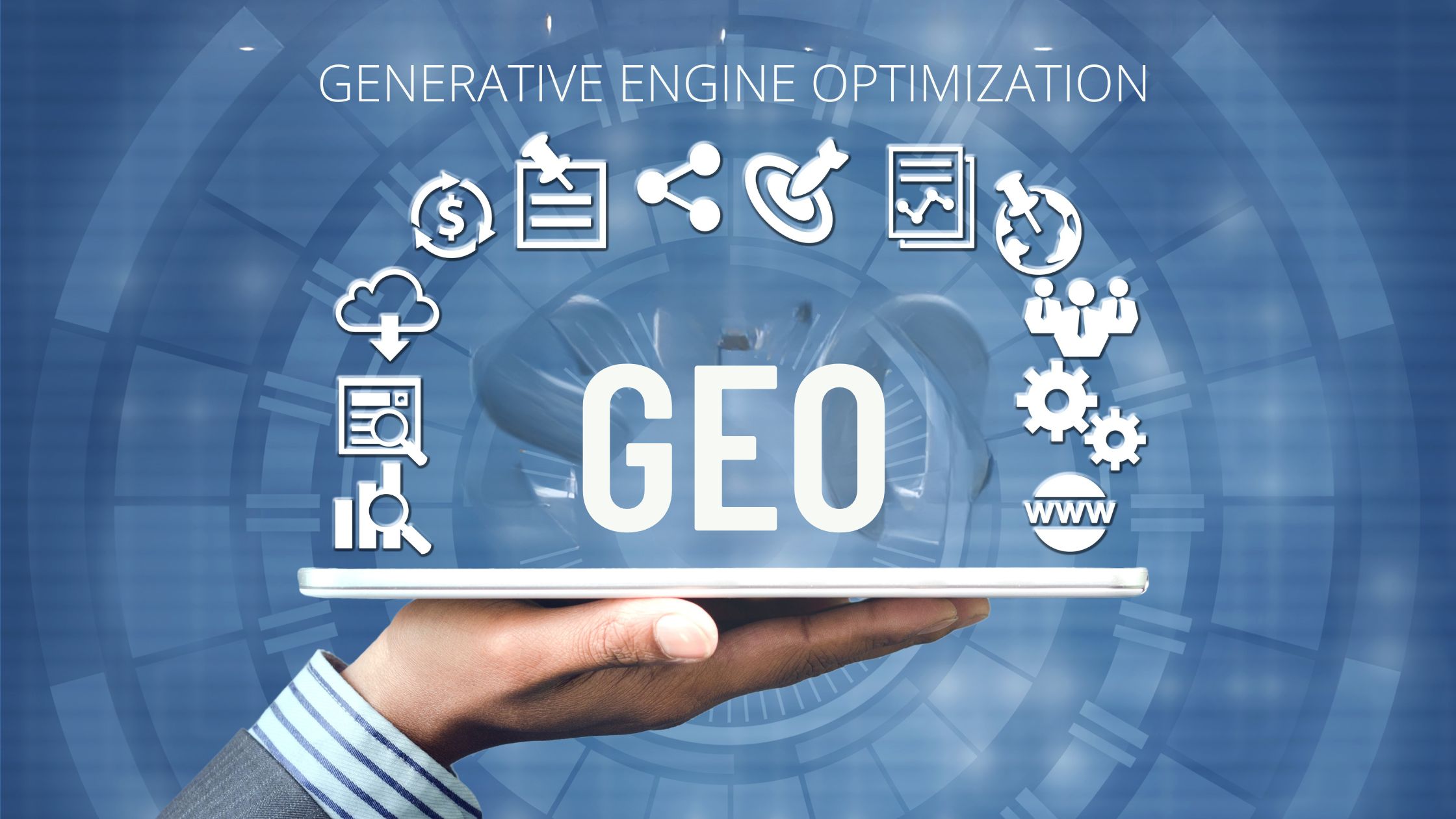Search no longer ends with a click; it ends with an answer. AI systems like Google Gemini, ChatGPT, and Perplexity aren’t just showing links anymore. They generate answers, summaries, and product recommendations based on what they understand from the web. These systems interpret context, not just keywords, and they only pull from content they trust. That’s where Generative Engine Optimization (GEO) comes in.
Quick Answer:
Generative Engine Optimization (GEO) means optimizing your content so AI systems can understand, summarize, and cite your website within their answers, not just list it on a search results page.
For NJ businesses, GEO is the bridge between traditional SEO and the new reality of AI-driven discovery. It ensures your brand shows up inside the answers customers see, not just below them.
What Exactly Is Generative Engine Optimization (GEO)?
GEO is the evolution of SEO for the generative web, the layer where AI engines interpret and repackage information instead of displaying it verbatim.
Traditional SEO was about ranking; GEO is about representation.
When someone in Newark or Hoboken asks Gemini, “Who are the best AI SEO agencies near me?” or “How does generative SEO help ecommerce?” the AI doesn’t list 10 links. It composes an answer based on structured, verifiable data from trusted sites.
If your site’s information is well-structured and machine-readable, you can become one of those trusted sources that AI cites directly in its response.
That’s what GEO in NJ is all about: building visibility not just in Google, but in the intelligent systems interpreting it.
How GEO Differs from Traditional SEO and AI SEO
| Aspect | Traditional SEO | AI SEO | GEO (Generative Engine Optimization) |
| Goal | Rank higher in SERPs | Help AI understand your content | Earn citations inside AI-generated answers |
| Focus | Keywords, backlinks, and technical SEO | Entities, schema, and on-page semantics | Meaning, factual precision, and structured context |
| Output | Blue links and snippets | Enhanced listings and visibility | AI citations, mentions, and summaries |
Traditional SEO helps search engines find your site.
AI SEO helps machines read your site.
GEO helps AI systems trust your site enough to use it as a source.
In other words, GEO doesn’t replace SEO; it extends it.
To understand how we got here, it’s helpful to revisit the shift from keywords to entities, the foundation of AI and GEO strategies.
Why GEO Matters for NJ Businesses
For New Jersey brands, local and ecommerce competition is already fierce. Dozens of companies fight for the same “near me” and “best in NJ” searches. But AI search doesn’t work like that anymore — it prioritizes structured, trustworthy content over keyword repetition.
When someone in Montclair asks ChatGPT, “Who’s the top DTC agency in New Jersey?” or “Where can I find reliable ecommerce SEO experts?” the AI looks for:
- Verified business entities (linked brand + location + service)
- Structured data (schema markup)
- Consistent facts and reviews across the web
If your business information is cohesive and optimized, you become one of the sources AI uses to generate that answer.
That means even if a user never clicks, your brand still gets visibility and authority, a key advantage in zero-click, AI-driven discovery.
The Core Pillars of a Strong GEO Strategy
1. Structured Data and Schema
Schema markup is how AI “reads” your website. It defines what your content means, not just what it says.
Start with essential schema types like:
- LocalBusiness (for name, address, hours, and service area)
- FAQPage (for common customer questions)
- Review / Product (for credibility and quality proof)
- HowTo (for instructional content)
Each schema element helps AI connect your information to known entities.
For example, a local NJ law firm using LocalBusiness and FAQ schema increases its chances of being cited in AI answers about “best attorneys in Newark.”
2. Entity Optimization
AI engines rely on contextual meaning. Entities like your business name, location, services, and team create that meaning.
Define and connect them clearly:
- Associate your brand with local entities (“NJ,” “Hoboken,” “Morristown”).
- Use consistent naming across your website, GBP, and directories.
- Link to reputable external sources that confirm your expertise.
This entity clarity helps AI interpret who you are and why you’re relevant.
3. Conversational, Answer-Based Content
AI prefers content that mirrors how people speak.
That means writing with clarity, structure, and concise answers.
To make your content GEO-friendly:
- Use question-based H2s and H3s (like “How does GEO help NJ businesses?”).
- Write 2–3 sentence summaries at the top of each section (ideal for AI Overviews).
- Add a short FAQ section with schema at the end of each key page.
Each section should read like an Answer Card: clear, direct, and ready for extraction.
4. Citation and Credibility Signals
AI systems evaluate trustworthiness through consistency.
They cross-reference business data, reviews, and mentions across multiple sites.
Improve your credibility by:
- Keeping NAP data identical across all platforms.
- Building citations in reputable NJ directories.
- Publishing reviews and testimonials consistently.
- Linking to or being mentioned by credible regional outlets.
The more aligned your digital footprint, the more likely AI systems are to include you in their generated responses.
5. Technical and Performance Readiness
AI models also value speed, accessibility, and structured hierarchy.
Audit for:
- Fast load times (under 2.5 seconds)
- Mobile responsiveness
- Strong heading structure (semantic H1–H3 order)
- Descriptive meta data and alt text
These aren’t just SEO basics; they’re also GEO fundamentals, improving both user experience and machine comprehension.
How to Measure GEO Success
Unlike traditional SEO, GEO performance isn’t about rank position — it’s about representation and recognition.
You can track progress using:
- AI Citations and Mentions: Search your brand in Google’s AI Overviews, Gemini, or Perplexity.
- Structured Data Performance: Use Google Search Console → Enhancements tab to track schema effectiveness.
- Entity Recognition: Tools like InLinks or Kalicube confirm whether your business is recognized in Google’s Knowledge Graph.
- Engagement Signals: Track time on page, branded search growth, and FAQ impressions, indicators of both authority and comprehension.
Each metric shows how well your site is being interpreted and trusted by AI engines.
Common GEO Mistakes to Avoid
- Treating GEO like keyword SEO.
- Ignoring schema validation or leaving it incomplete.
- Using inconsistent data across directories.
- Publishing unverified or outdated facts.
- Neglecting internal links between related entities and topics.
Accuracy, consistency, and structure always outweigh keyword density or volume.
The Bigger Picture: How GEO Complements SEO
GEO doesn’t replace SEO; it completes it.
SEO builds the foundation: visibility, ranking, and traffic.
AI SEO adds structure: schema, entities, and context.
GEO extends that into trust: citations, mentions, and AI comprehension.
Together, they form a full-spectrum strategy for modern search visibility.
Key Takeaways
- GEO = Visibility in AI systems, not just SERPs.
- Structured data and entities are non-negotiable – they make your content machine-readable.
- Local context and credibility drive NJ businesses to appear in AI answers.
- Trust and precision now matter more than keyword density.
- SEO, AI SEO, and GEO must work together to future-proof your visibility.
Conclusion: The Future of NJ SEO Is Generative
AI search isn’t coming; it’s already here.
Users no longer scroll; they ask. And AI systems deliver answers from content they understand and trust.
Generative Engine Optimization ensures your business becomes part of that answer.
Start small:
- Validate your schema.
- Connect your brand entities.
- Optimize content around conversational questions.
Each step builds trust, and trust is what earns citations in the age of AI.
When your website speaks the same language as AI systems, you don’t just rank, you get referenced.
Reference Links:
-
What is Generative Engine Optimization (GEO)?
Search Engine Land -
Complete Guide to Generative Engine Optimization (GEO)
Backlinko -
Generative SEO vs Traditional SEO
Moz Blog -
How to Rank in AI Overviews and Generative Search
HubSpot Marketing Blog -
Understanding Generative Search Engines
AI GPT Journal
Ready to Future-Proof Your SEO?
Get a free GEO audit to see how your NJ business can rank in AI Overviews and generative search results.

